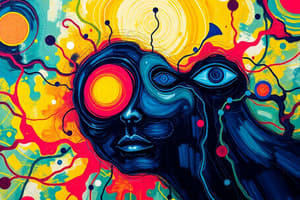Podcast
Questions and Answers
What do agonists produce?
What do agonists produce?
- No effect on tolerance
- Increased withdrawal symptoms
- Tolerance to the drug without withdrawal symptoms (correct)
- Decreased tolerance
In comparison with older people, how do babies spend their sleep time?
In comparison with older people, how do babies spend their sleep time?
Spend more time in the REM stage than other sleep stages
What is the best analogy for how psychologists view consciousness?
What is the best analogy for how psychologists view consciousness?
A dimmer switch for a light fixture
How many times do we pass through the different stages of sleep in a normal night?
How many times do we pass through the different stages of sleep in a normal night?
What is evidence supporting the role theory of hypnosis?
What is evidence supporting the role theory of hypnosis?
What does activation-synthesis theory try to explain?
What does activation-synthesis theory try to explain?
Which theory is supported by Hilgard's experiment that demonstrated the presence of a hidden observer?
Which theory is supported by Hilgard's experiment that demonstrated the presence of a hidden observer?
Which two sleep disorders occur most commonly?
Which two sleep disorders occur most commonly?
What category of psychoactive drug does marijuana fall under?
What category of psychoactive drug does marijuana fall under?
Night terrors and somnambulism usually occur during which stage of sleep?
Night terrors and somnambulism usually occur during which stage of sleep?
Which neurotransmitter is affected by opiates?
Which neurotransmitter is affected by opiates?
In the context of this unit, what does the term tolerance refer to?
In the context of this unit, what does the term tolerance refer to?
According to the information-processing theory, when do dreams occur?
According to the information-processing theory, when do dreams occur?
What level of consciousness controls involuntary body processes?
What level of consciousness controls involuntary body processes?
What concept does Professor Bohkle's experiment demonstrate?
What concept does Professor Bohkle's experiment demonstrate?
Flashcards are hidden until you start studying
Study Notes
Psychoactive Drugs and Tolerance
- Agonists are psychoactive drugs that create tolerance without causing withdrawal symptoms.
Sleep and Development
- Babies spend significantly more time in the REM sleep stage compared to older individuals.
Consciousness Theories
- Psychologists liken consciousness to a dimmer switch, indicating varying levels of awareness rather than binary states.
Sleep Cycle
- Individuals typically pass through various stages of sleep between 4 to 7 times in a normal night's sleep.
Hypnosis and Suggestibility
- People with rich fantasy lives demonstrate higher levels of hypnotizability, supporting the role theory of hypnosis.
Dream Theories
- Activation-synthesis theory provides an explanation for the origin and function of dreams, suggesting they arise from brain activity during REM sleep.
Hypnosis and Dissociation Theory
- Hilgard's experiment, which revealed a hidden observer, serves as evidence for the dissociation theory of hypnosis.
Common Sleep Disorders
- Sleep apnea and insomnia are the two most frequently occurring sleep disorders.
Marijuana Classification
- Marijuana is categorized as a hallucinogen among psychoactive drugs.
Sleep Disorders and Stages
- Night terrors and somnambulism (sleepwalking) typically happen during stage 4 of sleep.
Neurotransmitter Effects
- Opiates affect the neurotransmitter endorphins, influencing pain relief and pleasure.
Drug Tolerance
- Tolerance refers to the increasing need for higher doses of a drug to achieve the same effects previously experienced.
Dream Functions
- The information-processing theory posits that dreams occur during REM sleep as a means for the brain to process daily stressors and events.
Levels of Consciousness
- The nonconscious level of consciousness manages involuntary bodily processes, such as heart rate and digestion.
Mere-Exposure Effect
- The mere-exposure effect is demonstrated when participants show a preference for previously viewed geometric shapes, even if they cannot recall seeing them before.
Studying That Suits You
Use AI to generate personalized quizzes and flashcards to suit your learning preferences.




